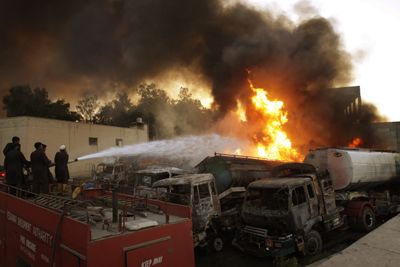Taliban’s Pakistani advance fuels fears
U.S. urges nation to counter militants

ISLAMABAD, Pakistan – Emboldened Taliban fighters imposed control over towns and villages ever closer to Islamabad on Thursday, raising alarm among many Pakistanis and foreign governments that authorities are ceding swaths of the country’s heart to Islamic hard-liners.
The Obama administration reacted with increasing alarm to the Taliban advances, warning the Pakistani government that failure to take action against the extremists could endanger its partnership with the United States as well as U.S. strategy in neighboring Afghanistan.
“The news over the past several days is very disturbing,” White House spokesman Robert Gibbs said, adding that the administration “is extremely concerned” and that the issue was taking “a lot” of President Obama’s time.
Obama held a White House meeting on the subject with Vice President Joe Biden, Secretary of State Hillary Rodham Clinton and Richard Holbrooke, the administration’s special representative to the region, officials said, and also brought it up in a separate session with congressional leaders. Holbrooke spoke by telephone to Pakistani President Asif Ali Zardari and with Foreign Minister Shah Mahmood Qureshi.
Pakistani authorities dispatched a small paramilitary force to the district of Buner – just 60 miles from Islamabad, the capital – where Taliban forces took control over much of the area this week. But Pakistani media said the Taliban repulsed the deployment, with unconfirmed reports saying at least one policeman had been killed.
Taliban from the nearby Swat Valley have infiltrated the area, emboldened by a government-sanctioned peace deal allowing them to enforce sharia, or Islamic law, in the one-time tourist paradise. Since entering Buner, the Taliban has reportedly set up checkpoints, begun patrolling roads and ordered barbershops to stop shaving beards.
In a meeting with tribal elders, Taliban militants agreed to lower their armed presence and not seek vengeance against locals who had resisted their arrival. But the Taliban said they would not withdraw from Buner.
“We will not leave the area,” a Taliban commander, Mufti Bashir, told local journalists.
The moves have prompted some of the roughly 1 million Buner residents to flee and have unsettled observers in Pakistan and abroad who fear that the government lacks the will to impose its authority.
Pakistan’s government has tried to downplay the threat to its sovereignty. Prime Minister Yousuf Raza Gilani told reporters in Islamabad that the government would see to it that the peace agreement isn’t violated. “The government will not allow anyone to challenge the government,” he said in a statement.
But it was uncertain how much force the government was prepared to use. Thursday’s limited dispatch of frontier guards, not the Pakistani army, suggested Islamabad is still not primed for a fight.
Supporters of the Swat deal, hammered out in February after two years of a bloody Islamist insurrection but signed into law by Zardari just last week, had contended it would secure peace and even divide militant factions. But any breathing room or disunity was apparently short-lived, if it ever existed.
The militants are “very organized,” said Ahmed Rashid, author of “Taliban: Militant Islam, Oil and Fundamentalism in Central Asia.” “They’re a faction of the main Taliban, and they’re spreading out from Swat to different valleys.”
The Taliban’s rule in Swat has been characterized by the burning of girls’ schools, the killing and beating of officials who opposed its power, and punishment for unrelated men and women seen together in public.
Analysts said they didn’t expect an immediate push by Taliban forces into Islamabad, contending it is more likely the militants will work to strengthen their grip in surrounding valleys.
In Pakistan’s parliament Thursday, many lawmakers blasted the Taliban for its brand of Islam and fretted over its growing clout.
“They are in Buner and coming toward the town of Haripur,” lawmaker Haider Abbas Rizvi told reporters outside parliament. “The government needs to take urgent steps and counter their march toward the capital.”
Opposition lawmakers said Taliban militants were trying to impose their brand of sharia and divide the country along sectarian lines.
But Ilyas Bilour, a senator from North West Frontier Province, where Swat and Buner are located, blamed inadequate security forces.
“The government should do something, as we have police that are weak and unable to stop the Taliban,” he said.
The U.S. State Department called for “very decisive and aggressive action” by Islamabad. S Clinton, who a day earlier described the situation as an “existential threat,” said the administration is “deeply concerned by the increasing insurgency that is destabilizing Pakistan.”
Defense Secretary Robert Gates publicly expressed frustration with reports that Taliban forces had moved eastward into two new districts of the country this week with no apparent resistance from government forces, bringing them within 60 miles of the Pakistani capital.
While “some” Pakistani leaders recognize the threat, Gates told reporters during a visit to Camp Lejeune, N.C., “it is important that they not only recognize it, but take the appropriate actions to deal with it.” Pakistani stability is central to U.S. efforts in neighboring Afghanistan, Gates said, “and it is also central to our future partnership with the government in Islamabad.”